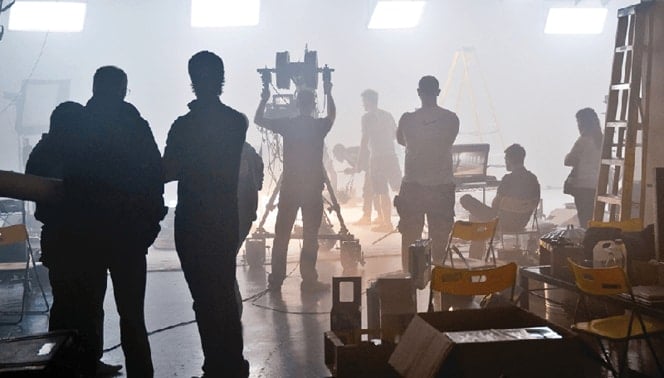The film industry is infamously hard to break into. This applies whether you’re behind the scenes, in post-production or right in front of the camera. It can be tricky to find that first job to kickstart your career. However, there are ways to gain experience and impress employers – it certainly isn’t easy, but it’s also not impossible. So we’ve put together 10 important lessons for breaking into the film industry.
What are the fundamental things you must know in order to kickstart your career?
1. Find Experience in Low-Level Productions
One of the best ways to start out in the film industry is to find experience in low-level productions. Whether it’s a student-led project or a low-budget production company, there’ll always be films in need of extra hands.
High-end TV and major film sets will most likely require previous work experience. So low-level projects are a great place to start if you lack this. Unfortunately, these projects rarely pay. Nevertheless, it’s still an excellent way to meet other people in the industry and gain valuable experience.
There are many ways to find jobs like this, through online application websites such as Mandy and Backstage, Facebook groups, or simply word of mouth. You may have to search a little bit. But as long as you put yourself out there, low-budget productions will likely be glad for any kind of help on their sets.
There are two halves (at least) to film; the half where you watch and the half where you make. You may be used to watching films and want a career in the industry because of this. But seeing how the sausage is really made is key in knowing whether or not this career will ultimately be right for you.

2. Be Prepared to Work in Unglamorous Roles
When you do find your first jobs in film, whether they are in an unpaid low-level production or perhaps something slightly higher up, don’t expect a whole lot of glamour.
Most entry-level jobs on film sets are as runners or production assistants. Typical duties for these roles include making tea and coffee, general admin work and sometimes driving actors to set. You may not enjoy these tasks that much. They may seem like a grind and far away from the dream you had of directing a blockbuster. However, they’re invaluable to a production and are a great starting point.
With these roles, you can still learn so much from watching everyone else on set and observing how they do things. In addition, it’s a great way to get your foot in the door at a production company and begin to climb the ladder. So don’t think you’re too good for an unglamorous role, it could be a vital first step in your film career.
More importantly though, it’s important to learn that much of the work in the film industry is very different from the glamour and glitz you get used to seeing on red carpets and late-night talk shows. If you’re serious about a career in the film industry, you have to be prepared to get your hands dirty. And the more you’re capable of doing so, the better you’ll come across to your peers. You’ll present as someone who thinks nothing is beneath them and someone who is prepared to graft, whatever the specific role.
3. Find Your Area of Focus

One of the most important steps in breaking into the film industry is to find an area in which you want to focus. There are so many different jobs within film. And it’s impossible to be a jack of all trades. Instead, choose one area to specialise in. Once you’ve found your area of expertise, it’ll make breaking into the film industry much easier.
Whatever you go into – sound, lighting, post-production, writing, directing – make sure it’s something you’re truly passionate about and are eager to learn more about. What is your skill set? And what role could that make you good at? It’s important to not let your ego blind you.
Not everyone can be Paul Thomas-Anderson, leading a crew with their unique vision and deeply embedded in the creative process. A film crew is typically an organism. And you have to work out how you can best serve that organism and help the end product become greater than the sum of its parts.
Moreover, finding your area of focus is a crucial step in breaking into the film industry as it gives you a clear direction. It’s something to work towards, making it easier to look for relevant jobs and projects.
4. Build Your Skill Set
Once you’ve found your area of focus, it’s important to build up your skill set as much as possible. This will make you more qualified for your role, and more likely to find continual work. It speaks to the mindset of progress.
This can be vital in the film industry. You’ll never reach a maximum level of expertise. Instead, you’ll always be growing and learning, finding new ways to articulate your craft. This is not only a great way to keep work but also to keep fresh in your attitude towards such work.
There are many ways to build up your skill set; attending specialised courses, following online tutorials, reading, meeting new people or volunteering on low-level productions and learning on the job.
Developing your skill set and improving your abilities is a massive step to breaking into the film industry. It not only transforms you from an amateur into a professional but keeps you continually growing. There is no end to your potential. This will also help you gain a reputation in the industry and find jobs through recommendations – making you a valued and recognized member on set.
5. Network, Network, Network.

One of the best ways to enter the industry is to make connections early on. You can do this by reaching out to individuals on LinkedIn and many other platforms, attending film festivals in order to meet other filmmakers and like-minded people, and gaining as much relevant work experience as possible.
The more people you know within the industry, the easier you’ll find it to break in. You’ll build relationships with people who will inherently trust you. This will breed recommendations to others. It’s a naturalistic way to build a network. This is because each member goes out and grows their own network in order to, in turn, feed back into yours.
When you are networking, understand what it is you can offer to other filmmakers and people within the industry, and then sell them your skill set. If you make a good impression on as many people as possible, you’ll find more opportunities coming your way. This will consequently allow you to get further and further embedded in the industry.
Networking doesn’t have to be the scary or cynical prospect it can often seem. It comes across as somewhat of a buzzword. But really it’s just a way of describing the process of building relationships. Knowing your skill set and knowing yourself will make this process easier. It will allow you to engage in an exchange of skills, ideas and opportunities.
6. Build a Portfolio
One of the best ways to showcase your abilities and break into the industry is to build up a portfolio/showreel of your work. Whether it’s a producer, director or agent; whoever is hiring you wants to see what you can do. And the best way to show them is to provide a physical example of your work.
You can either build up your portfolio with any previous work experience you may have done or include independent projects you have created. The most important thing is to showcase your area of focus. So whether that is writing, sound, cinematography or editing, make sure whatever you want to go into is the biggest thing on display.
If a strict portfolio of work isn’t appropriate for your skill set, then strive to make your CV stand out as much as possible. Remember that you will often be one of hundreds of CVs on a pile when applying for a role. So how can you make your CV pop? How can you highlight what is unique about what you can bring to the role? These are the questions to pay close attention to.

7. Work on Other People’s Films
Even if you’re aiming to be a powerful producer or an in-demand director at the very top of the industry, an important way to break into the industry is to work on other people’s films.
The most essential way to break into the film industry is by being in the room. So even if you’re watching other people carrying out the job of your dreams on the film set, it’s better than not being on the film set at all.
From working on other people’s films you’re not only gaining valuable experience but also creating crucial connections which will help you in getting close to the job you truly want. In addition, by working on other people’s films, you can meet talented crew and build partnerships with like-minded people. These people could one day be working on one of your own productions.
There’s no need to be overly cynical about making these connections. This might, in turn, put people off. After all, the most important thing is to do the job at hand and not be distracted by your own personal ambition. However, by just being around other aspiring filmmakers you will be making steps in the right direction. No need to overthink it, just show up and do your job to the best of your ability.
8. Prepare for Long Hours and Lack of Personal Time
One of the most important lessons to learn when breaking into the film industry is that on a film set, working long hours is not only normal but usually expected. Sometimes you’ll be starting your day off at the crack of dawn and not finishing until the late hours of the evening.
Your working hours will depend on whatever your role is. Overall though, when you’re first breaking into the industry, get ready to work all through the day and well into the night. Film shoots can last for months at a time. This will mean potentially working long days for an extended period of time, with little time off to unwind. Obviously, make sure this is clear before you enter into a contract, so you’re not unwittingly overworked and underpaid.
Deciding if the lifestyle suits you is a very significant thing to consider as you think about breaking into the film industry. This is especially true in production as working long hours can be par for the course. Again, a film set is not always a glamorous place but one of early mornings, late nights, hard graft and probably most of all, waiting around. So try and find a method of coping with this tricky working life so that you’re not over-stressed when it arrives.

9. Be Creative On Your Own Terms
It can be frustrating constantly waiting around for someone to give you an opportunity. So in light of this, you must where possible seek to give yourself your own opportunities.
In short, don’t sit around wishing you could be creative when you could, in fact, just be creative. This is obviously much harder to put into action for some disciplines over others. It’s much easier to sit down and write your own material, for example, than it is to act by yourself or light a stage in your bedroom.
However, even if the practicalities are a barrier, you should try and tap into your creative energy as much as possible. For instance, what practices can you try out other than your own? And what’s the most low-key version of your practice? If you’re a budding costume designer, you might try sketching your ideal costumes. If you’re a budding cinematographer, you might take a camera out and start finding your ideal lighting set-ups.
Whatever the method, it’s important to not be idle whilst waiting for your break into the film industry. Sharpening your creative mind will make you all the more ready to take ample advantage of opportunities when they arrive.
10. Get Your Work Seen and Advocate For Your Experience

How do you expect to make any progress if you lock all of your work away in a secret vault? Of course, it can be scary showing off projects which you have put so much hard work into. But if you want to get noticed, it’s necessary.
This applies not just to the films you make yourself but to the films you’ve worked on. You have to advocate for your experience. And hiding your track record or not shouting about it is the opposite of this. Even if you’re not necessarily proud of all the films you’ve worked on, you have to show how it has helped build your overall experience.
As a whole, a key way to break into the film industry is to meet the moment. You must show what you can offer to the specific production you’re looking to get on board with or for the specific job/opportunity you’re applying for.
How does your experience and skill set make you an asset? What is it that you offer that no one else can? This distinction is crucial when trying to break into the film industry. In a highly competitive industry, where and how do you fit in?
– What did you think of this article? Share It, Like It, give it a rating, and let us know your thoughts in the comments box further down…
– Struggling with a script or book? Story analysis is what we do, all day, every day… check out our range of script coverage services for writers & filmmakers.
This article was written by Lucas Blaxall and edited by IS staff.
Get *ALL* our FREE Resources
Tackle the trickiest areas of screenwriting with our exclusive eBooks. Get all our FREE resources when you join 60,000 filmmakers on our mailing list!


“..It’s much easier to sit down and write your own material..”
It’s never easy. Even so, this is a great guide for those just starting out. Above all else you will need good health and fitness, physical, mental and creative energy, determination, application, dedication, self-confidence and social skills, in order to make any kind of career.
Above all, don’t give up, so you may end up with some satisfying degree of success, even a brief moment of immortality, if not a full career.
Remember the Italian gentleman who wrote one novel in his life before he died. He never gave up. A number of publishers turned it down, but it was eventually published posthumously. It became an instant classic and, a few years later, a classic movie, Il Gattopardo (The Leopard) starring Burt Lancaster.
Success comes to those who don’t give up.